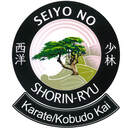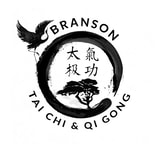|
Are you interested or committed to your martial art? There’s a big difference. "When you're interested in something, you will do it when it's convenient. When you're committed to something, you will do it no matter what." Those who are interested will practice their martial art when it’s convenient for them. If something more interesting is going on or they don’t feel like going to class that day, they don’t show up. They may even schedule appointments or other events at the same time as class. They often miss more classes then they attend in a month. They soon start to slip further and further behind in their training and will most-likely never achieve a 1st dan black belt or higher. Those who are committed to their art have a different attitude. They schedule class times and practice times on their calendar and see those time slots as non-negotiable. That’s THEIR time. No one else can take that time from them. They organize their life and schedules to be there, even if they aren’t 100% motivated that day, they know that showing up always makes them feel better. They know that being great at something is never convenient. It takes the three D’s… dedication, determination, discipline and desire. They don’t make excuses. They embody their craft. They make it known to their friends and family that their practice time is a core value that makes up who they are as a person. They don’t do it for the rank or the recognition, they do it because they ARE a martial artist, not someone who occasionally does a martial art. Are their times in which someone who is committed to their art misses a class or personal practice? Yes, but it’s rare. They might miss if they are extremely ill or have a major event (wedding, graduation, funeral, school/work function, religious event or the occasional vacation.) In some cases, work/school schedules might interfere with class times and the committed student might seek private lessons or contact their Sensei with questions on how best to practice on their own until their schedule changes. Making a commitment to something requires making sacrifices in your life that most people won’t do or understand. Commitment means living a life that most people will never achieve. "It's one thing to have a black belt in karate. It's another thing to BE one." *You can change the word “martial art” for anything you value and commit to in your life. Nourishing a great marriage, being a wonderful parent, having a healthy and fit body, building a successful business or achieving greatness in a field of study all take a level of great commitment.
0 Comments
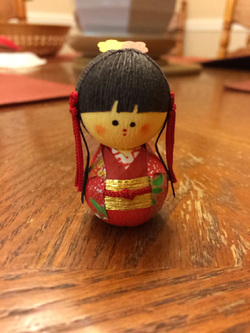 Recently, a gift of a tiny Geisha doll reminded me of something. She reminded me that when you fall down (or get knocked down) you get back up. And, you keep getting back up every time. It doesn't matter what challenges are thrown your way or what situation is occurring in your life at the time. You get back up. It doesn't matter if you are flat on your back at a low point in your life. You get back up. It doesn't matter if you are sick. You get back up. It doesn't matter if you weren't successful before or how many times you've tried and failed in the past. You get back up. It doesn't matter if you don't have anyone to lean on, pick you up, carry you or encourage you. You get back up. It doesn't matter if you've had your bell rung or your heart broken or your pride shattered. You get back up. You see, the world loves an underdog. The world wants to see you succeed. The world wants to see you get back up. Because it's the glorious grit of never quitting that emotionally charges the masses and inspires them. Then, when they fall down, and everyone does eventually... THEY GET BACK UP. ~ Vashon Borich, Sensei Like Branson Karate on Facebook Subscribe to this Blog! 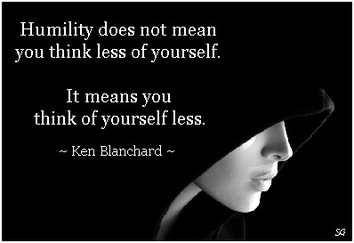 "There are many people out there who accomplish a little bit and decide that they are an expert. Humility is knowing what you don’t know." ~ Mark Manson (The Psychology of Life) In the martial arts world, I have noticed a trend with different practitioners and karate instructors. There appear to be two types of people, type A and B.
Type A, are the people who have a big mouth, who regularly talk about the things they have accomplished, they exaggerate their success and point out their trophies and belt ranks. Type A demands attention from those around them. They often dole out their sage wisdom to anyone and everyone who will listen. Then there is Type B, who downplay their successes or doesn't even mention them. Type B often admits when they don't know an answer, they aren't afraid to say when they make a mistake. They ask questions and learn from those in ranks below them and ahead of them. They regularly examine their own weaknesses and strive for constant improvement. They say very little, but demonstrate much through their actions. Although they may hold a very high rank in their primary martial art, they could be seen strapping on a white belt to learn a second, third or fourth martial art. The trend appears to be that the Type A's are only moderately successful in their martial arts. They may have had some accomplishments, but they had never achieved true master status or respect within the martial arts community. Where the Type B's are usually found to be legitimate masters in their art often with very high ranks. Not only were Type B's successful in their primary martial art, but in other arts as well. The Type B's had climbed to very peak of the martial arts community and achieved great respect from those around them. Taking on a type B attitude, pun intended as reference to the Beatitudes, is necessary for true success. This humility separates the wheat from the chaff. If you look through history and even the present, the greatest martial artists all have a humble spirit. Although many may not be widely known, they are at the top of their craft. They are male and female martial artists that have great knowledge, amazing levels of skill, true passion for their art and an ability to share their wisdom with others in ways that make their students passionate about the martial arts. Perhaps you don't have a deep desire to be a life-time martial artist. You can take these "Type B" traits and be a leader in any field, trade or industry. In summary, those traits are:
It's been a while since I last wrote. I've been involved in some introspective work and have been re-reading the Bubishi. If you are not familiar with the Bubishi, it is the classic manual of combat and was once considered a secret document passed down from master to student for centuries. The Bubishi is a classic Chinese work on philosophy, strategy, medicine and technique as they relate to the martial arts. It is sometimes referred to as the "bible of karate." There are several translations, the one I recommend is by Patrick McCarthy. One section that especially struck me was on the topic of balance. It goes on to state that "Perfect balance is a reflection of what is within." Balance can mean your physical capability to stand on one leg, for example. It can also mean the internal balance of your emotions and serene focus. In the Bubishi, physical and internal balance are one and the same. Balance is a requirement to be proficient in combat. If you have mastered balance, you are able to easily take advantage of or create a weakness in an opponent's posture. In the dojo we call this Kuzushi. Kuzushi is the Japanese term for unbalancing an opponent. It is the moment of weakness in which you can quickly overtake an opponent. The description that the Bubishi gives for the qualities contained in a balanced individual is poetic and beautiful... Like the sun's strength, your energy must radiate outward, your eyes should be as clear as the moon, and your legs should be like the rolling wheels of a cart. Your posture too, from head to toe, must be evenly balanced so that footwork and hand techniques support each other. If everything is in balance, no one will be able to defeat you. What I found most fascinating is that in order to have physical balance, you must first have internal balance. To cultivate internal balance one must grow in wisdom. The Bubishi lists nineteen laws of Wisdom. Here they are:
It may sound like the lead in for an email in your Spam box, but you really can change your life in 30 days. The secret is selecting a single, meaningful change, goal or project that you commit to doing for 30 days in a row. I was inspired when I watched a TED talk by Matt Cutts. If you are not familiar with TED, it is a Web site that contains a full library of "riveting talks by remarkable people, free to the world." You can watch the video that inspired me here: If you can't see the embedded video, you can navigate to it with this link: http://www.ted.com/talks/matt_cutts_try_something_new_for_30_days.html Come to think of it, watching one TED video for 30 days could be a positive life changing endeavor. I challenge you for the next 30 days to do something amazing. If you are short on ideas here are just a few in various categories. (Thank you to my students who offered up a number of these!)
Martial Arts
I welcome your comments on this blog as to what you selected as your 30 day challenge, what happened along the way, if it was successful for you or how it changed an aspect of your life. My philosophy of the martial arts is based on three things: Mind, Body and Spirit. My goal as a Sensei (teacher) is to facilitate growth in all three areas for every student that comes into my dojo. For good health I believe it is important to strive to improve these three areas of ones life.
First, it helps to understand the meaning of each of these elements: The Body = represents your physical health; strength, flexibility and stamina The Mind = represents your mental health; alertness, expanding ones knowledge through learning new things and stretching the mind with new challenges, ideas and thought processes The Spirit = your spiritual health; development of strong character, positive attitude, slow to anger, a purposeful life, belief in a power greater than yourself. I believe that each of us, myself included, must constantly work to hone our minds, bodies and spirits. Karate and the martial arts are methods for improving all three. But, it is important to also seek opportunities for improvement outside of the dojo.
Just for today, do something healthy for your body. Just for today, read or talk to someone about something that expands your mind. Just for today, take time to meditate or pray to your higher power. Focus on finding the positive aspects of any situation. If you choose to do these three things each day, you may soon find peace and the rewards of a healthy and fulfilling life.  In today's martial art world, it seems the type of arts that get the most attention are the sports schools like MMA (Mixed Martial Arts), Tae Kwon Do and JuJitsu schools. I have found that although many of these schools have students (and instructors) that are technically and athletically quite good, it saddens me to see some of them have lost the essence of the martial way. I realize this isn't all martial arts schools, but I have seen a trend that has lead many martial artists away from the true meaning of karate do. The Martial Way, also called Budo, means "knowledge as a way to improve ones life and the life of others." Budo is a way of living and a way of dying. Let's look back to ancient Samurai warriors, they lived a dangerous life in which they were very aware that each day could be their last. Death was always in mind, day and night, with the understanding that with their great skill and importance as protectors of their community that they had a great responsibility. They lived each day as if it were their last day. Like the knights of the renaissance period, Samurai's followed a code of moral principals. This code of conduct or way of Samurai life was called Bushido or "the way of the warrior." Bushido tampered the violent existence of the Samurai warrior with wisdom and serenity. This code, is often unwritten and passed on verbally to be recorded on one's heart as a moral compass for living life. As a martial artist of today, I believe Bushido is still a vital part of our training. We are learning techniques that could severely injure, maim or even kill another human life. Without a strong moral compass to guide us, we risk being a danger to society. I believe that Bushido should still be taught in all martial arts schools. I feel so strongly on this that I believe students who do not exhibit the moral compass of Budo in their life should be restricted on what training they receive in the martial arts. The last thing an instructor wants to hear is that a student has become a trained bully or worse, a trained killer. If you aren't familiar with Bushido, here are the seven tenets that most martial arts circles believe were used by the Samurai: 1. Justice / Rectitude / Right Decision 2. Bravery / Courage 3. Benevolence/ Charity 4. Respect/ Courtesy 5. Honesty 6. Loyalty / Faithful / Devoted 7. Filial Piety (respect for your parents and ancestors) I believe it is our duty, as martial artists, to ensure the Budo code isn't forgotten. We should do this not just with words, but through living out the tenets and traveling the Martial Way. 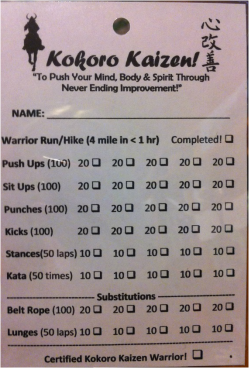 The Punch Card of challenges. The morning began earlier than most people choose to wake up on a Saturday morning. But these were no ordinary people. These were Kokoro Kaizen warriors. And, by 7 a.m. they were at my doorstep suited up and ready to push themselves to their limit in a morning full of challenges. After some warm-up stretches we were off to run/hike close to 4 miles on rugged terrain and up steep hills. I hoped my warriors were up for the challenge. Some ran, some walked and one even limped to the finish, but all of them completed the first challenge. Without much time to fully catch their breaths, we launched into a circuit of strenuous exercises that tested their mental fortitude, physical strength and tenacity. Dangling from a ribbon around their necks was a daunting punch card of exercises. Each exercise must be completed 50 to 100 times before the day was done. There were moments of frustration, exhaustion and even one who had to pause to empty the contents of his breakfast. But everyone pushed themselves to their limit. They impressed me with their spirit. They performed with the strength and passion of Samurai Warriors. Through sweat, grit and dirt they pressed on. By 11 a.m. everyone had completed their punch card and was certified as a Kokoro Kaizen warrior. We completed the day with a swim in the lake and a BBQ feast. Right now, I am beaming with pride for my students. I can't think of a better way to have celebrated our dojo's two-year anniversary. Thank you to all who came out. And, thank you to the parents, siblings and friends who helped with the event. I am honored to have such a great group. ~ Vashon Borich, Sensei You can view more photos from the 2012 Kokoro Kaizen celebration here: https://www.facebook.com/media/set/?set=a.492194880791920.118980.255052444506166& 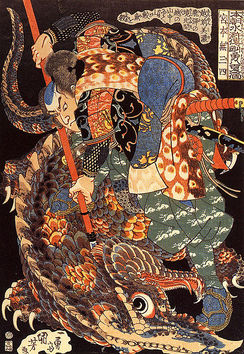 Have you ever been pushed to your limit? I'm not talking about being tired from a hard work out or being mentally drained from a challenging day. I'm talking about mentally, physically and spiritually just barely hanging on. Perhaps you have been in a situation where you found yourself out of breath, heart pounding, body aching, bruised, bloodied and barely standing. It's a point where you are so worn out that it takes every ounce of mental energy to focus on moving one foot in front of the other. Step by step you move, inching yourself forward with a determination to never give up even though you are completely tapped out. If you have ever been there, then you are one of very few people who have. Rarely do we push ourselves to our limit. “We know that human beings are very kind to themselves and are living as easily as they can. In this kind of situation we only maintain what we have, and the only way to obtain something new is to push ourselves strongly forward. The purpose of practicing karate is to develop physical and mental strength by putting ourselves into hardship. We're all capable of so much more than we apply ourselves to, but in order to actualize that potential, we have to constantly test our limits.” ~ Tom Callos With this in mind, I am hosting a special challenge that coincides with a celebration. The challenge is called Kokoro Kaizen (more on this in a bit). The celebration is the two-year anniversary of the Branson branch of Seiyo-no Shorin-ryu Karate & Kobudo. Our dojo, at the Branson Sports Club, first opened it's doors on Aug. 28, 2010!
We will host our anniversary challenge/celebration on Saturday, Aug. 25th at Sensei Borich's home. For those of you who haven't been to Sensei's home, she lives on a little acreage surrounded by woods, hiking trails and a path down to the lake. It will be a nice setting for the challenge and celebration. What does Kokoro Kaizen mean? Kokoro is a Japanese word that represents mind, heart and spirit. In the Japanese culture, there is no distinction between the three. Similar to the Father, Son and Holy Spirit in Christianity, they are different, but still the same. In Japan, they often point to their heart when discussing kokoro as it represents the center or essence of a human being. Kaizen is a Japanese word for "improvement." Specifically, it represents a practice that focuses upon continuous improvement for the better. It's a process of continuous, gradual, orderly and never ending improvement. In karate, it means pushing yourself further each day... testing your limits. So, Kokoro Kaizen means "To improve the mind, body and spirit through never ending improvement." What will happen at Kokoro Kaizen? Kokoro Kaizen will test your limits. It's an opportunity to push yourself physically, mentally and spiritually. It is a series of challenges that all willing participants will be tasked to do. It will not be easy, but those who complete the challenges and push through their own limitations will be awarded. The event starts at 7 a.m. with group exercises and then a 4-mile run/hike. Some of the challenges that you can expect are:
For those Warriors who successfully complete Kokoro Kaizen, they will have their names emblazoned on a hand-carved hardwood Samurai totem. The Samurai totem is being crafted by Ronald Leach, Hanshi. The totem will have a permanent home in the Branson Dojo for all to see. The event will be followed by lunch and an anniversary celebration. How do I participate in Kokoro Kaizen? There are two ways to participate; as a Warrior or on the Support Squad. The Warriors will compete in the event. The Support Squad will assist with tracking participants, set up, clean up, food/water and general cheer leading. Cost to participate is by donation only. We will use the donations to start a karate scholarship fund for honorable students who could use help with purchasing equipment and karate tuition. The deadline to register is Aug. 7, 2012. Where do I get more information and register? Click here to Contact Sensei Borich. She will provide information and registration documentation. A Kokoro Kaizen warrior cannot give up. Even after he is broken, fatigued and wanting nothing more than to just give up, he must keep fighting. There may come a time when a Kokoro Kaizen warrior won't have the luxury to quit fighting, because lives may depend on it. 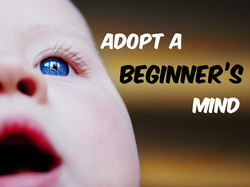 I am a beginner. Sure, I've been involved in some sort of Martial Art since I was 8 years old and I'm 38 now. But, in my mind I'm still a beginner. Beginner's don't have to be cool or claim to know everything. Beginner's don't get uptight when they make a mistake. Beginner's are always learning. They seem to have more fun, too. They aren't overly critical of themselves. They don't classify themselves as "good" or "bad." They are simply a beginner... someone who is in the present and there to learn. Beginner's love what they do regardless of how well they do it. Or, should I say, beginner's love unconditionally. This concept of being a beginner is really a mindset, a "beginner's mind." By adopting a beginner's mind, it opens you to learning without ego getting in the way. So often, as adults, we tell ourselves, "I know this! I should have done better! Anything I do should be done well or not done at all. Or, this is how I've always done it." A beginner's mind means temporarily throwing out all of your opinions, beliefs, logic and reason just for the sake of learning. It is okay to say, "I don't know." For this is the first step in learning something new. In the martial arts, an "I don't know" mind is the wisdom of the warrior. We don't allow ourselves to say "I don't know" often enough. This is because we always know, or we always think we know. Most of the time when we think we know, we don't really know at all. All we know are our past impressions of the situation that is happening now, the conclusions we came to in the past or judgments about similar events or circumstances that happened to us before. "I Don’t know" means keeping an open mind and responding according to circumstances, not according to how we assume things will be. Being a beginner means letting go of being an expert. We are all experts in something. We may think we are experts in our job, in raising children, in cooking a certain meal or in how we communicate with others. It’s difficult to let go of being an expert. Doing so means confessing that we really don't know anything. What we know belongs to the past. But this moment is new and offers its unique challenges. If I let go of being an expert, I can listen to others with an open mind. Then I can find that even a beginner has something to teach me. Beginners aren't afraid to fail. When we were children we were always starting something new. Then, as we go through our twenties, thirties, and further, we become more hesitant about being a beginner again. Why? Maybe it's because we don’t want to look silly when we fail. Having a Beginner's mind means it's okay to fall down, it's okay to fail and it's okay to laugh at ourselves when we make mistakes. Tell yourself (and others if they are watching), "I'm a beginner!" Then get up, dust yourself off, smile and immerse yourself in learning something new. A beginner's mind can transform the way one experiences life. It opens your mind to new possibilities and makes life fun. In the next section, I list some thoughts to meditate on to help maintain a beginner's mind. |
AuthorVashon Borich-Leach, Sensei teaches traditional karate and tai chi in Branson, Missouri. She considers herself a life-time student of the arts. Her blog is an open journal of lessons learned in the martial arts. If you are a martial artist and would like to contribute to her blog please contact her. Archives
May 2023
Categories
All
©2012 Branson Karate & Kobudo™
|
©2010-2024 Vashon Enterprises LLC, DBA Branson Karate™
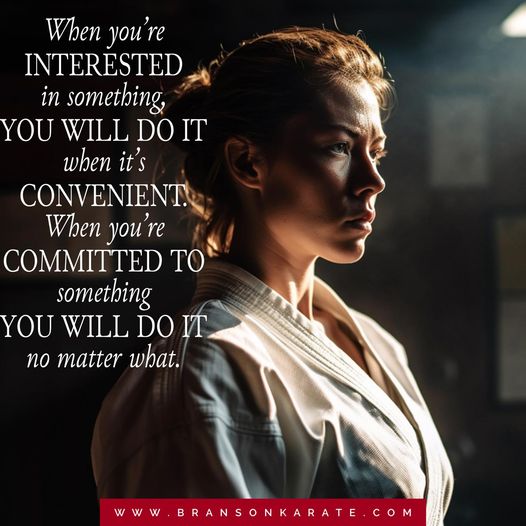
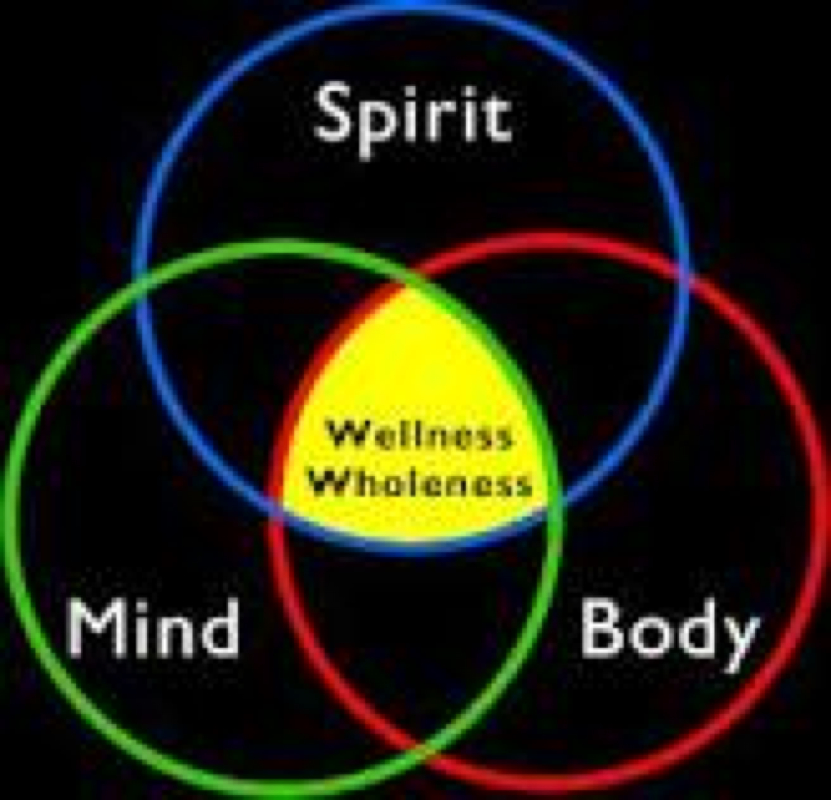
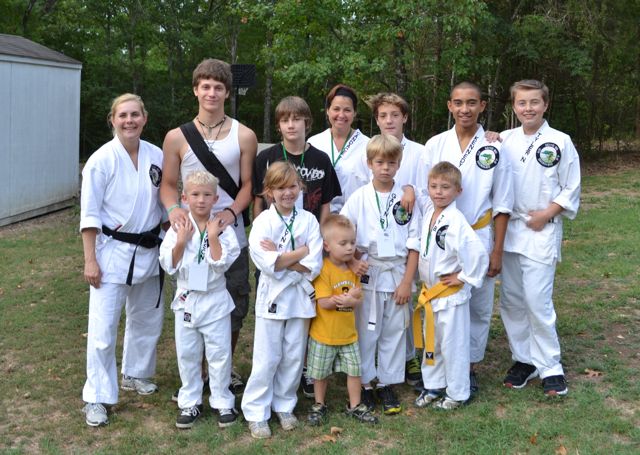
 RSS Feed
RSS Feed
